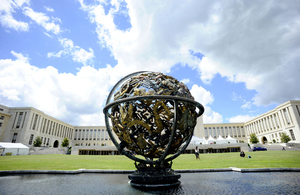Human Rights Council 34: UK statement on the rights of the child
The statement on the rights of the child was delivered on the 6 March 2017 during the annual full day discussion at the Human Rights Council.

The Human Rights Council takes place at the Palais des Nations in Geneva
The United Kingdom welcomes the report by the United Nations High Commissioner for Human Rights on the Protection of the Rights of the Child as part of the implementation of the 2030 Agenda for Sustainable Development.
The United Kingdom is fully committed to the protection and promotion of children’s rights. Violence, discrimination, poverty and marginalisation can impact children disproportionately, affect their health, education and overall development and put them at an increased risk of exploitation, abuse and trafficking. Last year the UK government pledged £50 million to tackle violence against children globally, including £10m to finance a global programme to tackle online child sexual exploitation in 17 countries.
We are ever mindful of the concept to “leave no one behind” as we work towards the realisation of the Global Goals for Sustainable Development. To that end the UK is at the forefront of international efforts to end harmful practices and work towards the full realization of target 5.2 and 5.3, which obliges all states to eliminate Violence Against Girls, Female Genital Mutilation (FGM) and Child, Early and Forced Marriage (CEFM). The UK’s £35 million five year programme to tackle FGM is the largest of any individual country. Through the UK’s £39 million “Accelerating Action to End Child Marriage” programme we are strengthening legal frameworks, and supporting the necessary associated shift in behaviours to end the practice.
On education, the UK is working to transform the lives of the world’s poorest and most vulnerable girls. It is alarming that almost one third of all countries still have not achieved parity in primary education, leaving many girls behind. Girls’ access to education continues to be impaired by deep-seated discrimination; social and cultural stereotyping; and gender-based violence. We have supported education for the most vulnerable and since 2010 the UK has supported 11.3 million children in primary and lower secondary school (including 5.3 million girls) and worked through global partners to train 380,000 teachers.
We would like to ask the panel, how best we can ensure a coordinated response by the international community, to ensure that every girl receives an education?